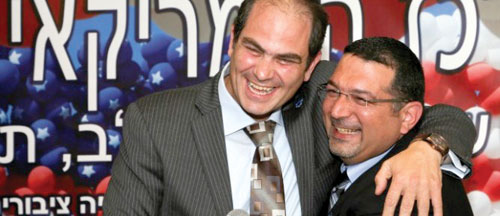.jpg)
When Jerusalem resident Eli Beer implemented a neighborhood-based volunteer emergency response system to Israel in 2006, he wasn’t dreaming of prizes, only of saving lives.
But in recognition of the fact that United Hatzalah of Israel has brought together some 2,100 trained volunteers from every sector of Israeli society to respond to medical emergencies in Arab and Jewish neighborhoods without discrimination, Beer and Arab-Israeli United Hatzalah-East Jerusalem leader Murad Alyan were chosen to receive the 2013 Victor J. Goldberg IIE Prize for Peace in the Middle East from the New York-based Institute of International Education.
The award, which includes a $10,000 prize that the men intend to donate to their organization, was presented at a June 24 ceremony at the U.S. Embassy’s American Center in Jerusalem.
The close friendship between Beer, a religious Jew working in real estate, and Alyan, a religious Muslim working as a registered nurse and medical translator, began in 2007 when Alyan approached Beer about extending United Hatzalah’s neighborhood-based services to largely Arab East Jerusalem. He recruited the first 34 volunteers for the unit, and now oversees more than 100.
Both had been involved in voluntary emergency response since the late 1980s and knew that ambulances from Israel’s national Magen David Adom often get delayed because of traffic, security checkpoints and unmarked streets in some areas. Having a crew of local volunteers ready to respond by foot, moped or ambucycle, until further help arrives, has cut initial response time to three minutes at most.
When ISRAEL21c spoke with them before the ceremony — with their beaming wives and children looking on in pride — the men’s arms were draped around one another and they even finished each other’s sentences.
“If you share a common love, you’ll overcome … “ begins Beer.
“… all the barriers,” Alyan concludes.
“Murad and my love is about saving lives,” Beer continues. “We’ve been doing this for over 20 years and that’s why we overcome anything that could be a barrier to our relationship. And the same goes for our volunteers, who come from different sectors — haredi [ultra-Orthodox], settlers, secular, Arabs. They all love saving lives and that’s what connects us.”
Alyan adds, “People think that peace is only for politicians. We save lives with no political agenda or opinions. This can lead to peace. You can do it anywhere.”
In fact, Beer tells ISRAEL21c, a United Hatzalah team is soon traveling to New Delhi to help establish its model there. “We’re going to start a process in India of having people of different cultures and religions saving lives together, just like in Israel.”
Goldberg is a longtime trustee of the IIE, an independent nonprofit founded in 1919 to forward the international exchange of people and ideas toward achieving lasting peace. The organization has 1,000 member institutions and administers the U.S. government’s Fulbright Student Scholar Program among other study and training initiatives.
A retired corporate vice president of IBM, Goldberg instituted his prize with an endowment in 2005. Among the past winners are Amal Elsana Alh’jooj and Vivian Silver, co-executive directors of the Negev Institute for Strategies of Peace and Development (http://israel21c.org/social-action-2/empower-the-bedouin-and-build-a-future/).
He related that as a teen in 1948, living in a diverse immigrant Chicago neighborhood where he sometimes experienced anti-Semitism, the founding of the state of Israel “entranced” him for its promise of a safe haven based on the moral and cultural values on which he was raised.
“But after decades of witnessing strife in the Middle East, I wondered what, if anything, could bring peace to this Jewish homeland I so cherish,” he said. “Maybe, only work at the grassroots level could form the basis of lasting peace down the road. And so I envisioned this prize.”
He had serious doubts that the IIE could find a Jewish Israel and a Muslim Israeli whose joint achievements fit the criteria for awarding the peace prize. “But in fact we have done so, with no shortage of candidates, for nine years.”
He lauded Beer and Murad “for their brilliant conception and brilliant execution of an idea that goes to the very core of humanity—man’s responsibility for his fellow man” and called them models for other agents of change.
Goldberg and his entourage had the opportunity to meet some of the multicultural volunteers — including a religious Jewish settler and a Muslim East Jerusalem Arab who had just come from tending to an unconscious child in the Arab neighborhood of Silwan. “The blending of human feeling with advanced technology blew me away,” Goldberg remarked.
“It’s just the beginning,” said Beer, who previously won a Presidential Award for Volunteerism and was named a World Economic Forum Young Global Leader. “We want to get to 3,000 volunteers and we want to reduce response time to 90 seconds. No doubt, this will bring a better environment between everyone … in this part of the world.”
By Abigail Klein Lachman, Israel 21c










